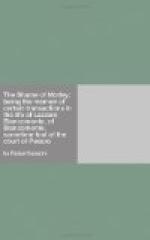It was in those days that I first came to love her with as pure a flame as ever burned within the heart of man, for the very hopelessness of it preserved its holy whiteness. What could I do, if I would love her, but love her as the dog may love his mistress? More was surely not for me— and to seek more were surely a madness that must earn me less. And so, I was content to let things be, and keep my heart in check, thanking God for the mercy of her company at times, and for the precious confidences she made me, and praying Heaven—for of my love was I grown devout—that her life might run a smooth and happy course, and ready, in the furtherance of such an object, to lay down my own should the need arise. Indeed there were times when it seemed to me that it was a good thing to be a Fool to know a love of so rare a purity as that—such a love as I might never have known had I been of her station, and in such case as to have hoped to win her some day for my own.
One evening of late August, when the vines were heavy with ripe fruit, and the scent of roses was permeating the tepid air, she drew me from the throng of courtiers that made merry in the Palace, and led me out into the noble gardens to seek counsel with me, she said, upon a matter of gravest moment. There, under the sky of deepest blue, crimsoning to saffron where the sun had set, we paced awhile in silence, my own senses held in thrall by the beauty of the eventide, the ambient perfumes of the air and the strains of music that faintly reached us from the Palace. Madonna’s head was bent, and her eyes were set upon the ground and burdened, so my furtive glance assured me, with a gentle sorrow. At length she spoke, and at the words she uttered my heart seemed for a moment to stand still.
“Lazzaro,” said she, “they would have me marry.”
For a little spell there was a silence, my wits seeming to have grown too numbed to attempt to seek an answer. I might be content, indeed, to love her from a distance, as the cloistered monk may love and worship some particular saint in Heaven; yet it seems that I was not proof against jealousy for all the abstract quality of my worship.
“Lazzaro,” she repeated presently, “did you hear me? They would have me marry.”
“I have heard some such talk,” I answered, rousing myself at last; “and they say that it is the Lord Giovanni who would prove worthy of your hand.”
“They say rightly, then,” she acknowledged. “The Lord Giovanni it is.”
Again there was a silence, and again it was she who broke it.
“Well, Lazzaro?” she asked. “Have you naught to say?”
“What would you have me say, Madonna? If this wedding accords with your own wishes, then am I glad.”
“Lazzaro, Lazzaro! you know that it does not.”
“How should I know it, Madonna?”
“Because your wits are shrewd, and because you know me. Think you this petty tyrant is such a man as I should find it in my heart to conceive affection for? Grateful to him am I for the shelter he has afforded us here; but my love—that is a thing I keep, or fain would keep, for some very different man. When I love, I think it will be a valorous knight, a gentleman of lofty mind, of noble virtues and ready address.”




